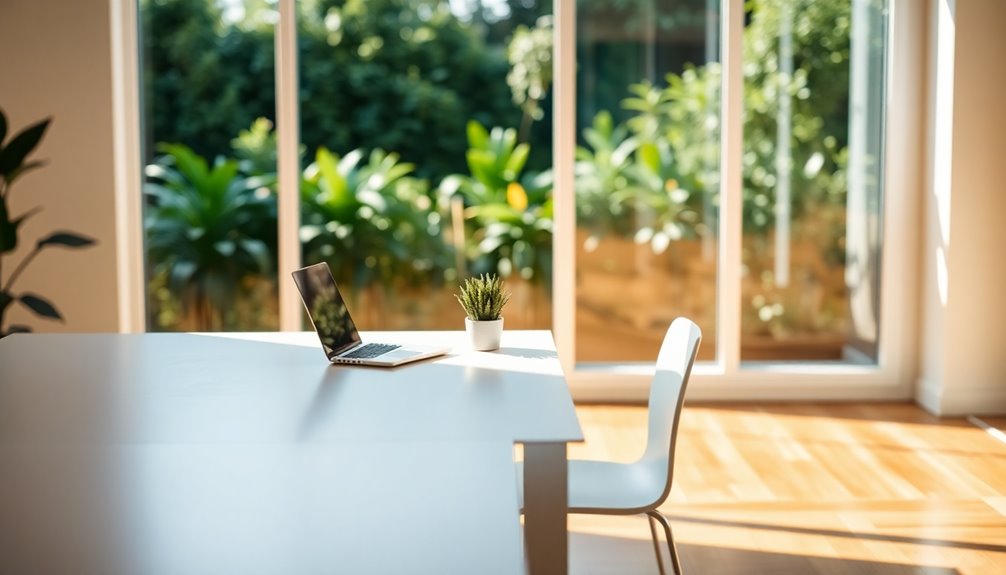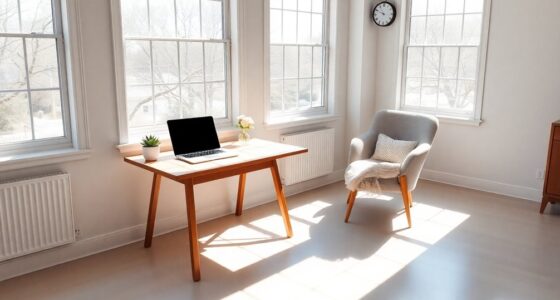Minimalism plays an essential role in achieving work-life balance by helping you declutter your environment and focus on what truly matters. By reducing distractions and aligning your daily actions with core values, you can enhance productivity and reduce overwhelm. This intentional lifestyle choice not only improves your mental clarity but also fosters meaningful relationships. Embracing minimalism can lead to greater satisfaction and fulfillment in both your personal and professional life, revealing even more benefits as you explore further.
Key Takeaways
- Minimalism fosters clarity by eliminating distractions, allowing individuals to focus on essential tasks that align with their core values.
- A decluttered workspace reduces stress and enhances productivity, contributing to a healthier work-life balance.
- Prioritizing meaningful relationships through minimalism helps cultivate a supportive network that nurtures personal and professional growth.
- Implementing digital minimalism minimizes unnecessary distractions, enabling better time management and increased focus on work and personal life.
- Establishing clear boundaries between work and personal life is essential for maintaining balance, supported by a minimalist lifestyle.
Understanding Minimalism: Principles and Philosophy
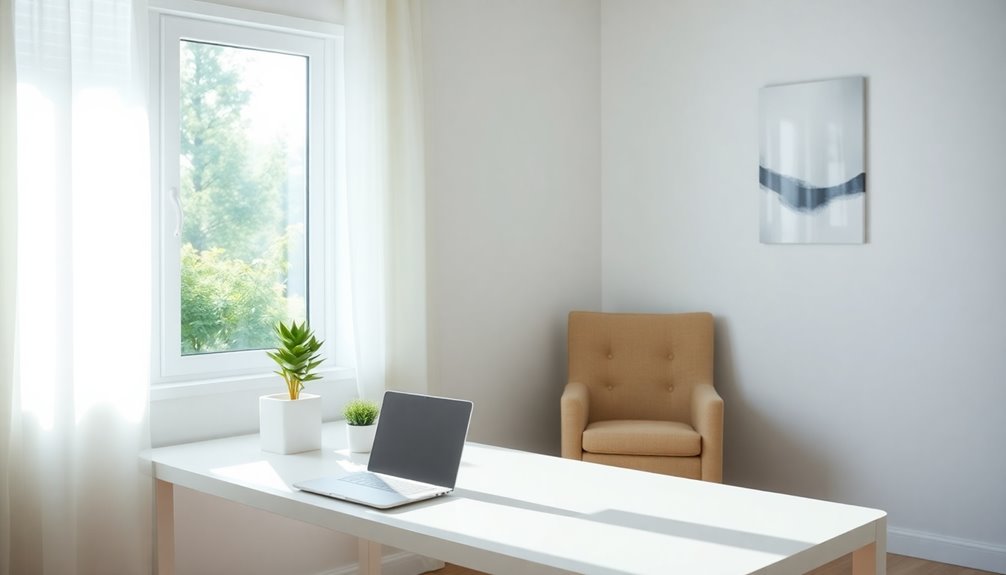
When you embrace minimalism, you're not just decluttering your space; you're also simplifying your life by focusing on what truly matters.
The principles of minimalism encourage you to prioritize essential values and commitments, leading to greater mental clarity and fulfillment.
By adopting a minimalist lifestyle, you learn to eliminate distractions, which allows you to concentrate on meaningful relationships and experiences that align with your aspirations.
Studies show that individuals practicing minimalism experience lower stress levels and higher happiness, contributing to a better work-life balance.
This mindset shift toward valuing quality over quantity enhances your productivity and well-being, making it easier to manage your time effectively and invest energy into what truly enriches your life. Additionally, embracing eco-friendly minimalism can further support sustainable habits that enhance overall well-being.
The Impact of Clutter on Mental Health and Productivity
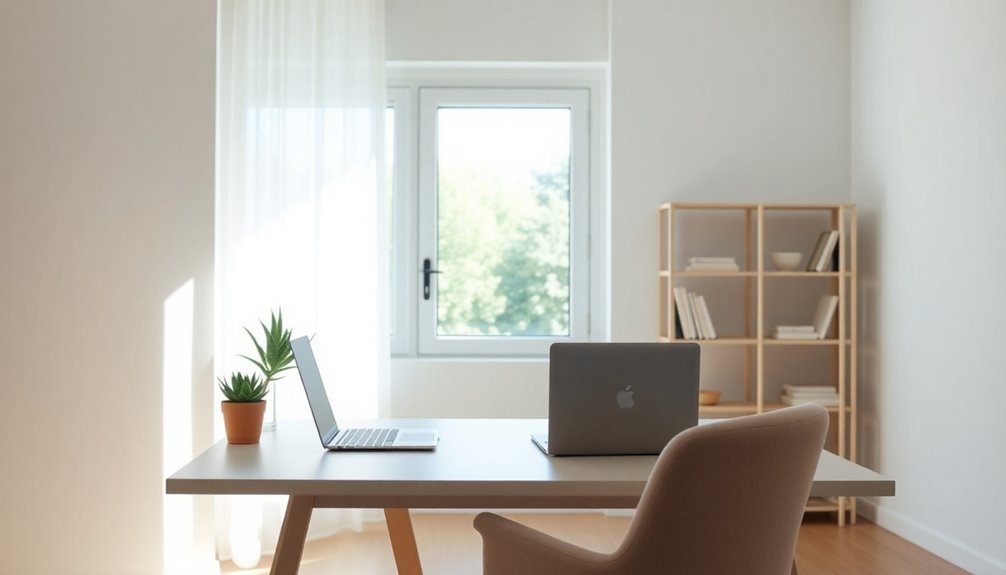
Clutter can greatly impact your mental health and productivity, often leading to feelings of anxiety and overwhelm.
A cluttered workspace distracts you, draining your creativity and motivation, and can even contribute to burnout for nearly 60% of professionals.
By adopting a minimalist approach, you can considerably reduce stress and enhance your mental well-being.
Adopting minimalism significantly lowers stress, promoting better mental health and overall well-being.
Studies show that a tidy environment not only improves sleep quality but also boosts focus and productivity during work hours.
Embracing minimalism can lead to a 30% increase in happiness and efficiency, fostering a more fulfilling work experience.
Ultimately, maintaining a clutter-free space is essential for achieving work-life balance and cultivating a healthier, more productive lifestyle. Furthermore, minimalism can help new parents manage sleep deprivation more effectively, allowing them to focus on their responsibilities without the added stress of clutter.
Minimalism as a Tool for Prioritizing Work and Personal Life
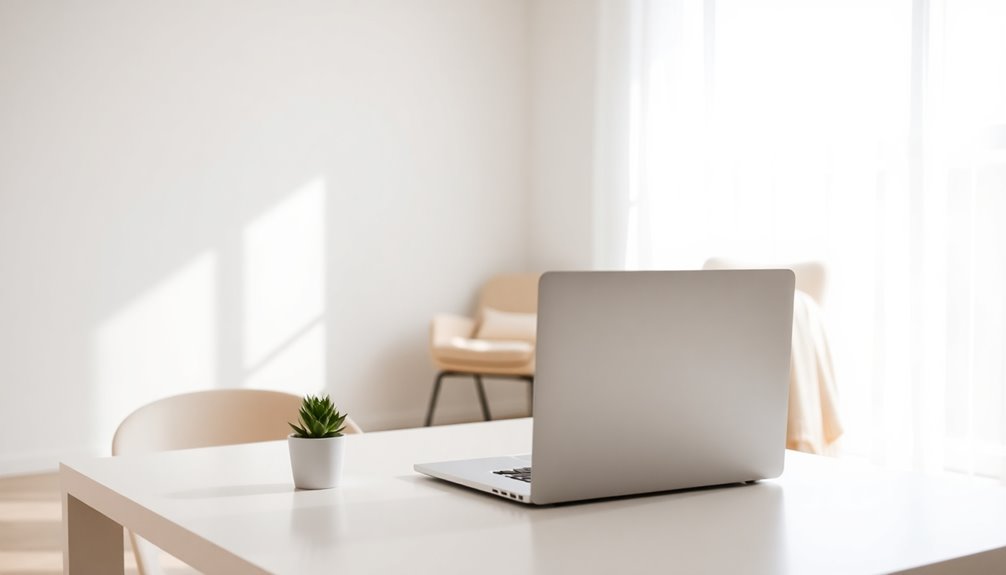
Minimalism can be your key to prioritizing what truly matters in both work and personal life.
By decluttering your environment and focusing on essential tasks, you can boost your productivity and find balance more easily.
Embracing this mindset not only reduces overwhelm but also aligns your daily actions with your core values. Additionally, practicing self-care techniques can further enhance your ability to maintain this balance and improve overall well-being.
Essential Task Prioritization
As you embrace a minimalist approach, prioritizing essential tasks becomes more manageable, allowing you to align your daily activities with your core values. This focus can greatly reduce stress levels and foster a healthier work-life balance. Here's how you can implement essential task prioritization:
- Identify your core values and align tasks accordingly.
- Eliminate unnecessary items and distractions from your workspace.
- Reflect daily to enhance focus on enriching commitments.
- Streamline workflows for better time management. Additionally, incorporating mindfulness practices can help you maintain clarity and presence in both work and personal life.
Decluttering for Focus
When you clear away distractions from your physical and digital spaces, you create an environment that enhances focus and productivity.
Embracing minimalism through decluttering not only reduces overwhelm but also allows you to concentrate better on essential tasks. Studies show that nearly 60% of professionals face stress in cluttered environments, emphasizing the need for simplicity to achieve work-life balance.
By keeping only what's necessary, you can prioritize meaningful tasks that align with your core values. This approach fosters a culture of efficiency, leading to a 30% boost in happiness and effectiveness.
Regularly evaluating your workspace can further improve focus, enhancing overall productivity and promoting a satisfying work-life integration. Additionally, adopting a high vibrational energy mindset can further amplify your ability to achieve your goals.
Minimalism is a powerful tool for achieving your goals.
Balancing Work and Life
Balancing work and life becomes easier once you adopt a minimalist mindset, allowing you to focus on what truly matters.
By embracing a minimalist approach, you can greatly reduce stress and burnout while enhancing your personal time.
Here's how:
- Prioritize tasks aligned with your core values.
- Reflect daily on commitments to identify unnecessary tasks.
- Keep only essential responsibilities to avoid overwhelm.
- Establish clear boundaries between work and personal life.
This shift fosters an organized workspace and boosts your overall well-being.
You'll find that eliminating excess commitments redirects your energy toward meaningful experiences and nurturing relationships, creating a healthier integration of work and life. Additionally, adopting a minimalist lifestyle can lead to improved financial management and a clearer understanding of retirement savings plans, which can enhance your sense of security and freedom.
Embrace minimalism to elevate your happiness and efficiency in both domains.
Strategies for Implementing Minimalism in Daily Routines
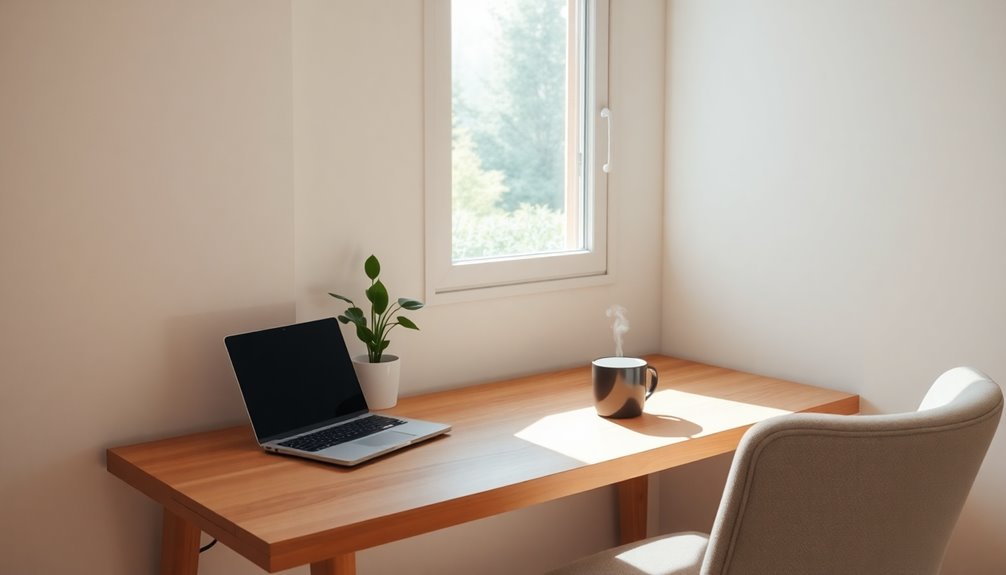
Implementing minimalism in your daily routines can be transformative, especially when you focus on decluttering both your physical and digital spaces.
Start by tidying your workspace; keep only essential items that enhance productivity. This reduces stress and burnout, making work more enjoyable.
Tidying your workspace by retaining only what enhances productivity can significantly reduce stress and increase enjoyment in your work.
Next, practice digital minimalism: unsubscribe from unnecessary emails and organize files to eliminate distractions.
Establish clear boundaries between work and personal life by designating specific hours and creating a dedicated workspace at home.
Prioritize tasks that align with your core values using a focused to-do list, boosting your happiness and efficiency.
Regularly assess your commitments, eliminating non-essential activities to foster intentionality and achieve a better balance between your professional obligations and personal interests. Additionally, consider how user options for managing consent can enhance your focus by minimizing distractions from ads and unnecessary notifications.
Case Studies: Successful Minimalists and Their Work-Life Balance
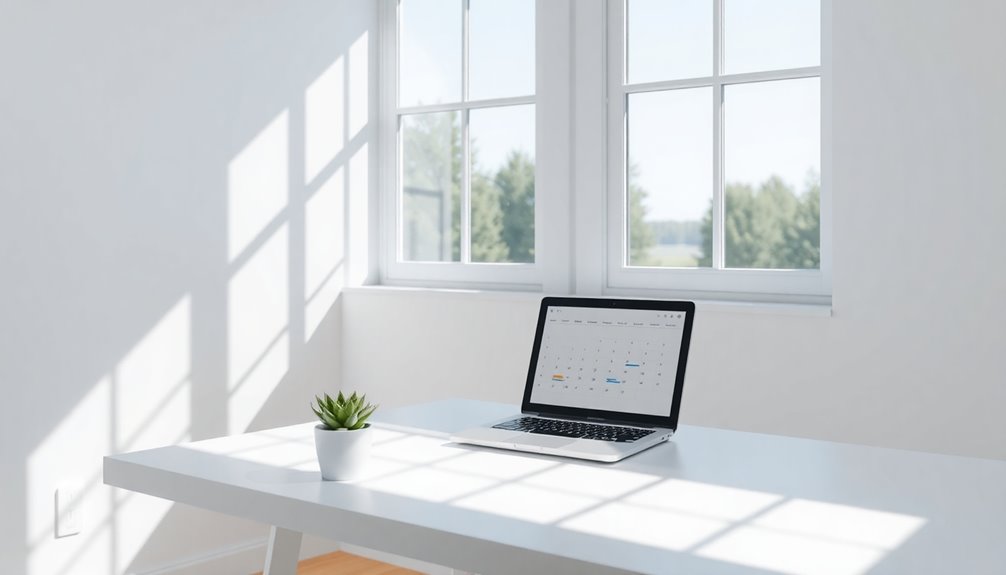
Many individuals have embraced minimalism, not just as a lifestyle choice but as a strategy for achieving a healthier work-life balance.
Successful minimalists often report significant improvements in their lives, including:
- A 30% increase in happiness and efficiency
- Lower stress levels, with 60% of cluttered professionals facing anxiety
- Enhanced productivity through organized workspaces
- More meaningful relationships due to prioritized time and energy
Additionally, the practice of minimalism aligns with the principle of continuous learning, fostering an environment where individuals can focus on personal development and growth.
Overcoming Challenges in Adopting a Minimalist Lifestyle
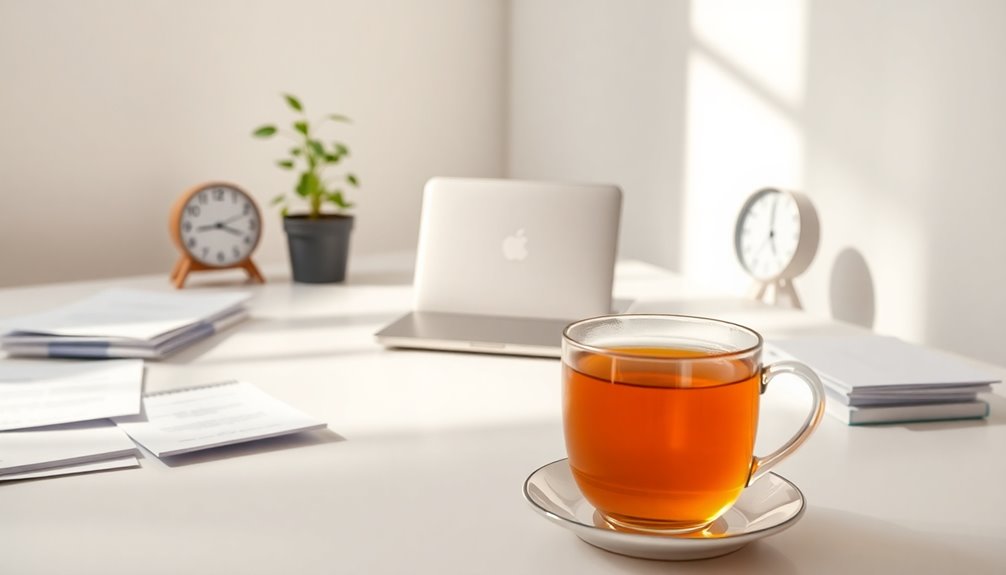
While embracing a minimalist lifestyle can seem intimidating at first, tackling the challenges step by step makes the process more manageable. You might feel overwhelmed by clutter and decision fatigue, but remember that a minimalist approach helps reduce stress and improve focus.
Start by decluttering gradually and prioritizing essential tasks to ease the discomfort. Engaging in regular reflections will guide you through this change. The benefits of minimalism, such as increased happiness and lower stress levels, often outweigh initial hurdles. Additionally, adopting emergency preparedness essentials can further enhance your peace of mind as you simplify your life.
Don't hesitate to seek out a supportive community; sharing experiences with others can provide motivation and encouragement. By leaning on this network, you'll find it easier to overcome challenges and fully commit to a simpler, more balanced lifestyle.
Long-Term Benefits of Minimalism for Career Satisfaction and Personal Fulfillment
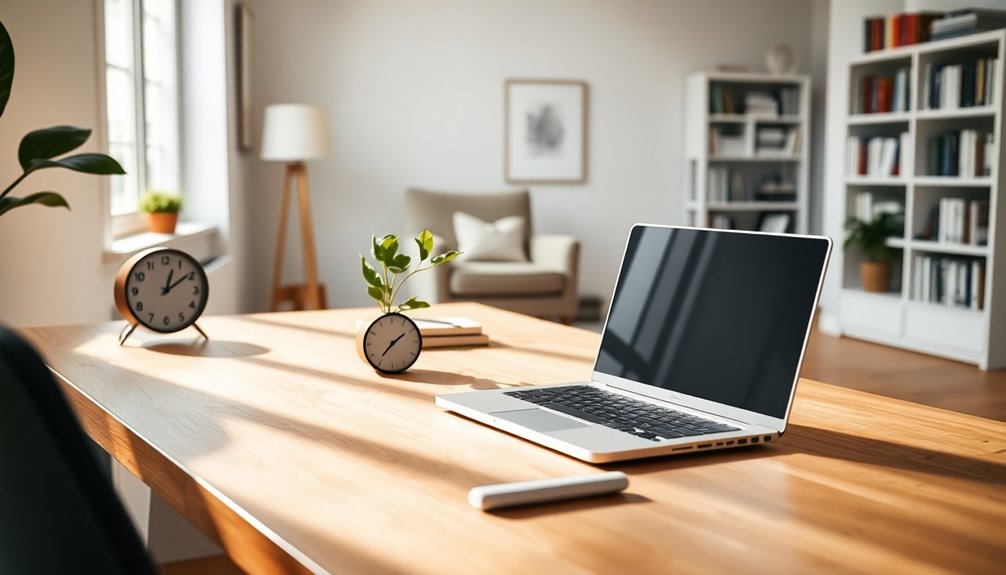
Embracing minimalism can sharpen your focus and bring clarity to your work life, enhancing both career satisfaction and personal fulfillment.
By clearing away distractions, you make room for meaningful relationships and connections that enrich your professional journey.
This intentional approach not only boosts your happiness but also aligns your work with your core values. Additionally, it can foster innovative problem-solving skills that are essential in today's rapidly changing work environment.
Enhanced Focus and Clarity
When you adopt minimalism in your workspace, you're likely to experience a significant boost in both focus and clarity.
By simplifying your environment, you eliminate distractions and can truly prioritize what matters. This shift enhances productivity, allowing you to concentrate on meaningful tasks that align with your values.
Consider these benefits of minimalism:
- 30% boost in happiness and efficiency
- Reduced overwhelm through prioritization of essential tasks
- Enhanced mental clarity fostering creativity
- Improved decision-making abilities
Meaningful Relationships and Connections
By prioritizing meaningful relationships, minimalism transforms not just your personal life but also your career satisfaction. When you eliminate distractions and excess commitments, you create space for intentional interactions that foster deeper connections.
These meaningful relationships increase your happiness and efficiency, contributing to personal fulfillment. By focusing on quality over quantity, you cultivate connections that align with your core values, enhancing collaboration and communication in professional settings.
Minimalism also lowers stress levels, making it easier to manage your relationships effectively. Ultimately, nurturing these significant connections conserves your energy, allowing you to thrive both personally and professionally.
Embracing minimalism equips you with the tools to build a supportive network that fuels your journey toward greater satisfaction and fulfillment.
Frequently Asked Questions
How Does Minimalism Affect Work?
Minimalism affects your work by creating a clearer, more organized environment.
When you reduce clutter, you'll find it easier to focus and manage stress. This streamlined approach can boost your happiness and efficiency, allowing you to concentrate on essential tasks without the overwhelm of distractions.
You'll notice improved mental clarity and decision-making skills, leading to greater productivity and job satisfaction.
Ultimately, embracing minimalism transforms your workspace into a more conducive place for success.
What Is the 30 Day Rule for Minimalism?
The 30 Day Rule for minimalism encourages you to simplify your life by decluttering gradually.
Each day, you remove an increasing number of items—one on day one, two on day two, and so on.
By the end of the month, you'll have eliminated 465 items.
This process helps you confront your attachment to possessions and reflect on what truly matters, making it easier to create a more organized and meaningful environment.
What Are the 3 Characteristics of Minimalism?
Imagine you're sailing a ship, and minimalism is your compass. The first characteristic is simplicity; it guides you to clear away distractions.
Next, you've got intentionality, steering your choices toward what truly matters.
Finally, there's mindfulness, allowing you to savor each moment rather than rush through them.
As you navigate life's waters, these three traits help you chart a course toward clarity and fulfillment, ensuring your journey remains focused and purposeful.
How Does Minimalism Make Life Better?
Minimalism makes life better by helping you focus on what truly matters.
By eliminating distractions and clutter, you create a serene environment that boosts your happiness and efficiency.
You'll find decision-making becomes clearer, allowing you to prioritize essential tasks that align with your values.
This shift reduces stress and overwhelm, freeing up mental energy for meaningful activities and relationships.
Embracing minimalism lets you cultivate a more fulfilling and balanced life.
Conclusion
Incorporating minimalism into your life can greatly enhance your work-life balance by helping you focus on what truly matters. For instance, consider Sarah, a marketing manager who decluttered her workspace and simplified her daily tasks. As a result, she found more time for her family and hobbies, boosting her overall happiness. By embracing minimalism, you too can streamline your life, reduce stress, and achieve a fulfilling balance between your professional and personal worlds.
